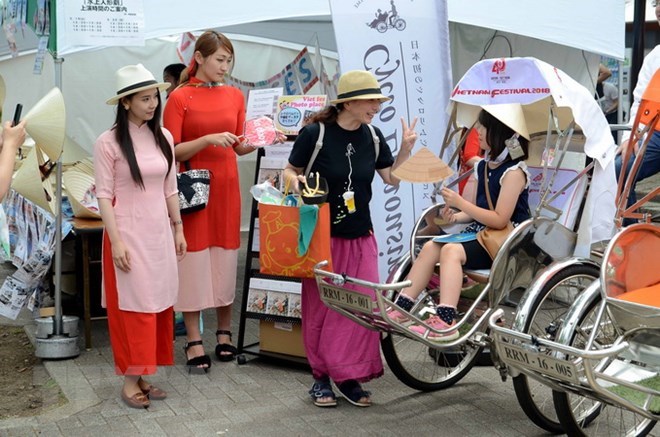
The Vietnam Festival 2018 kicked off at Yoyogi park in the Japanese capital of Tokyo on May 19 on the occasion of the 128th birth anniversary of late President Ho Chi Minh.

Visitors pose with
Vietnam's three-wheel cyclos
(Source: VNA)
Speaking at the opening
ceremony, Vietnamese Ambassador to Japan Nguyen Quoc Cuong said that the event
is part of important activities to take place in
Japan in 2018 in celebration of the
45th anniversary of bilateral diplomatic ties.
Besides
Tokyo, the Vietnam Festival will be
organised in other localities across
Japan,
including
Fukuoka, Aichi,
Osaka, Kanagawa, and Saitama, within this
year, Cuong added.
Former Japanese Prime Minister Yasuo Fukuda expressed his delight at the
development of the two countries’ relations, while hoping that the friendship
will be strengthened to meet aspirations.
Deputy head of the Japan-Vietnam Friendship Association Motoyoshi Ryoikichi
told the Vietnam News Agency that the bilateral ties are in a flourishing
period.
There are around 240,000 Vietnamese people living in
Japan, a tenfold increase compared
with the figure five years ago.
The
Vietnam festival was
first held in
Japan in
September 2008, becoming the biggest-ever festival of
Vietnam held in
the country, attracting 150,000 visitors in just three days.
Since then, the festival has been organised annually and become the largest
cultural exchange event between the two countries.
This year’s event has 120 pavilions, including 60 cuisine ones, and 50 others
introducing the image of Vietnamese land and people and Vietnamese goods, along
with art performances.
The two-day festival is expected to attract over 150,000 visitors.
Source: VNA
The clothing of women reflects the culture of the Muong, Thai, Tay, Dao, and Mong ethnic groups in the northern province of Hoa Binh.
Gongs hold a special place in the cultural and spiritual life of the Muong ethnic people in Hoa Binh province. More than musical instruments, they are an indispensable part of community rituals and collective memory, echoing through generations as a spiritual thread linking the past, present, and future.
Preserving and promoting the cultural values of the Muong ethnic group has become an urgent task in the current context, as many traditional values face the risk of fading away. This effort requires not only protecting the cultural identity but also eliminating outdated customs and developing a modern cultural lifestyle, contributing to sustainable values for the Muong community in Hoa Binh province.
The Muong ethnic culture, deeply rooted in Vietnam’s mountainous north, continues to be preserved and revitalised by dedicated individuals and communities determined to safeguard their ancestral identity.
The Muong group is one of the largest ethnic minorities in Vietnam, primarily found in Hoa Binh province. The Muong people in Hoa Binh boast a rich and diverse cultural treasure that reflects the unique identity of this ethnic group. Accounting for over 63% of the province's population, they have created and preserved numerous distinctive cultural values, contributing to their unique identity. Their cultural heritage is an invaluable asset, at the heart of their national identity, and represents a vibrant spiritual life that must be preserved and promoted in today’s modern world.
For generations, the ethnic communities of Hoa Binh province, particularly the Muong people, have preserved vibrant festivals deeply intertwined with the region’s geography, nature, and social traditions. These celebrations enrich Hoa Binh’s spiritual life and cultural identity, reflecting both folk beliefs and the intermingling of ethnic customs. Many of these festivals have endured the test of time, passed down through generations and continuing to thrive today. Among them, the Khai Ha (Going Down to the Field) festival stands out as one of the most significant events of the Muong ethnic group.



